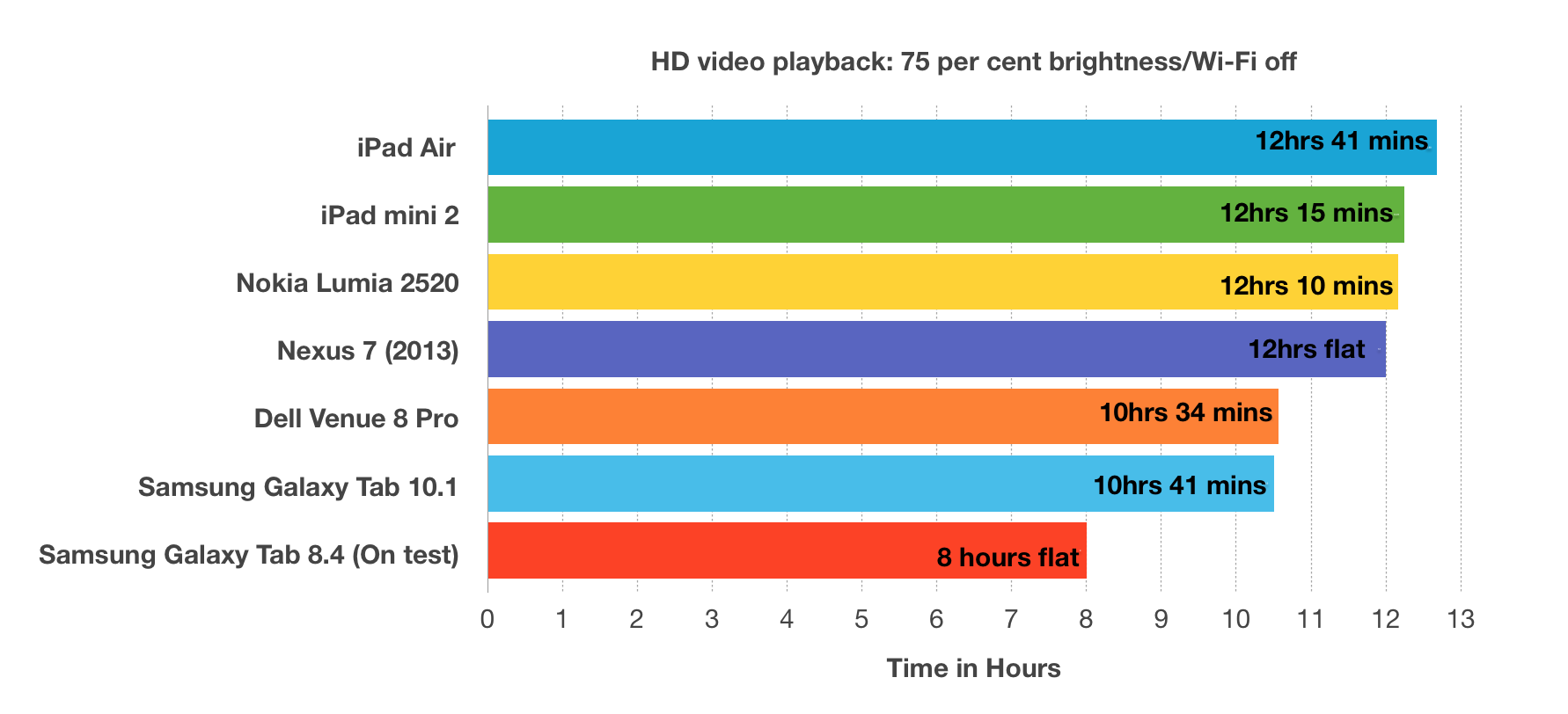Samsung Galaxy Tab Pro 8.4in review
Samsung unleashes a fantastic all-round Android tablet but it's expensive.


The Galaxy Tab Pro is a brilliant all-rounder and is tailored for enterprise usage. But the battery life is disappointing and it's not cheap.
-
+
Big screen in portable chassis; Portable; Micro SD support; Secure Android
-
-
Middling battery life; Expensive
Battery
Samsung usually delivers in this area - but it's the one weakness of the Galaxy Tab Pro. The 4,800 mAh battery pack isn't quite big enough to handle the demands of the larger screen.
The battery life of the Galaxy Tab Pro 8.4in isn't atrocious, but it's not up to the level you expect from sub-10in tablets.

Samsung quotes 10 hours of web browsing and up to 10 hours of video playback. But in our Iron Man test, where the brightness was set to 75 per cent and Wi-Fi was switched off, we clocked of 8 hours.
The inability to replace the battery compounds the problem - so be mindful of this if you're looking for tablet for heavy duty work. When you're down to the last 5 per cent charge - the device automatically locks the brightness of the screen to try and extend battery life for as long as possible.
Overall
The Samsung Galaxy Tab Pro 8.4in is the vendor's best sub-10in device to date.
Sign up today and you will receive a free copy of our Future Focus 2025 report - the leading guidance on AI, cybersecurity and other IT challenges as per 700+ senior executives
The design, display and connectivity options are superb. Samsung has reined in TouchWiz and included key business apps and Secure Android. Performance is good - but you can expect the occasional app to crash.
The biggest letdown is battery life, an area where Samsung is usually strong. The Tab Pro was four hours short of the iPad mini 2 in the same test, so Samsung's attempt to keep the weight down has sacrificed longevity.
The Galaxy Tab Pro isn't cheap either. Pricing starts at 350. This makes it more expensive than the iPad mini 2 (319), and is more than double the price of the Google Nexus 7 (189). Samsung's tablet is better suited for enterprise deployment, but if you're looking for a device for personal use, the Nexus 7 provides the best value.
We've given the device 4/5 stars though because, on balance, it does deliver on what users need. And we're not alone in liking it - there are countless end user reviews on the website that, in the main, sing the Pro 8.4in tablet's praises. One user on Amazon, even described the device as their "first 5-star tablet." High praise indeed.
This article was first pubilshed on 17/03/14 and has been updated multiple times (most recently on 11/08/14) to reflect new information that has become available since its original publication.
Verdict
The Galaxy Tab Pro is a brilliant all-rounder and is tailored for enterprise usage. But the battery life is disappointing and it's not cheap.
Screen: 8.4in, 2560 x 1600 LCD (341ppi) OS: Android KitKat 4.4.2 + Secure Android Knox Processor: 2.3GHz Qualcomm Snapdragon 800 quad-core processor GPU: Adreno 320 Memory: 2GB RAM Storage: 16GB/32GB + micro SD up to 64GB Connectivity: Wi-Fi 802.11a/b/g/n/ac, Bluetooth 4.0, Infra-red Other: Micro-USB, 3.5mm headphone jack Camera: 8-megapixel, 1080p 30fps video Battery: 4,800mAh Size: 219 x 128.5 x 7.2mm Weight: 331g
-
 ‘1 engineer, 1 month, 1 million lines of code’: Microsoft wants to replace C and C++ code with Rust by 2030 – but a senior engineer insists the company has no plans on using AI to rewrite Windows source code
‘1 engineer, 1 month, 1 million lines of code’: Microsoft wants to replace C and C++ code with Rust by 2030 – but a senior engineer insists the company has no plans on using AI to rewrite Windows source codeNews Windows won’t be rewritten in Rust using AI, according to a senior Microsoft engineer, but the company still has bold plans for embracing the popular programming language
By Ross Kelly Published
-
 Google drops $4.75bn on data center and energy firm Intersect
Google drops $4.75bn on data center and energy firm IntersectNews The investment marks the latest move from Google to boost its infrastructure sustainability credentials
By Nicole Kobie Published
-
 OpenAI says prompt injection attacks are a serious threat for AI browsers – and it’s a problem that’s ‘unlikely to ever be fully solved'
OpenAI says prompt injection attacks are a serious threat for AI browsers – and it’s a problem that’s ‘unlikely to ever be fully solved'News OpenAI details efforts to protect ChatGPT Atlas against prompt injection attacks
By Nicole Kobie Published